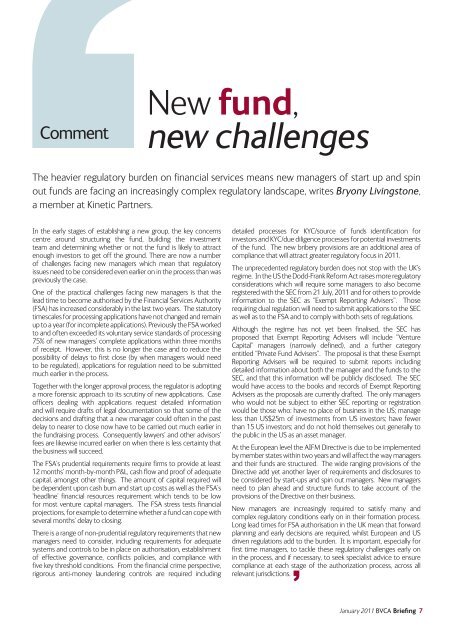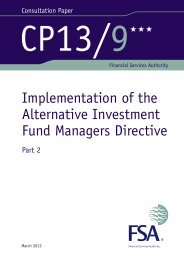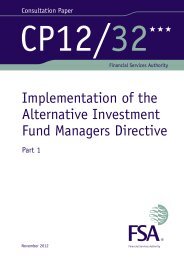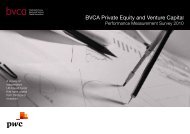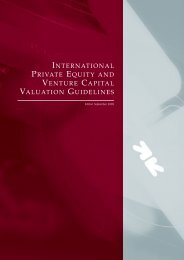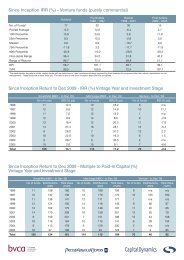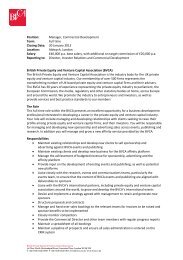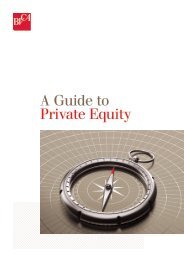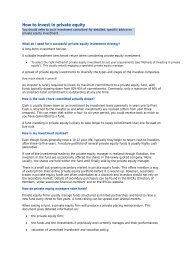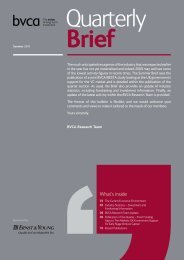fundraising special - BVCA admin
fundraising special - BVCA admin
fundraising special - BVCA admin
Create successful ePaper yourself
Turn your PDF publications into a flip-book with our unique Google optimized e-Paper software.
Comment<br />
New fund,<br />
new challenges<br />
The heavier regulatory burden on financial services means new managers of start up and spin<br />
out funds are facing an increasingly complex regulatory landscape, writes Bryony Livingstone,<br />
a member at Kinetic Partners.<br />
In the early stages of establishing a new group, the key concerns<br />
centre around structuring the fund, building the investment<br />
team and determining whether or not the fund is likely to attract<br />
enough investors to get off the ground. There are now a number<br />
of challenges facing new managers which mean that regulatory<br />
issues need to be considered even earlier on in the process than was<br />
previously the case.<br />
One of the practical challenges facing new managers is that the<br />
lead time to become authorised by the Financial Services Authority<br />
(FSA) has increased considerably in the last two years. The statutory<br />
timescales for processing applications have not changed and remain<br />
up to a year (for incomplete applications). Previously the FSA worked<br />
to and often exceeded its voluntary service standards of processing<br />
75% of new managers’ complete applications within three months<br />
of receipt. However, this is no longer the case and to reduce the<br />
possibility of delays to first close (by when managers would need<br />
to be regulated), applications for regulation need to be submitted<br />
much earlier in the process.<br />
Together with the longer approval process, the regulator is adopting<br />
a more forensic approach to its scrutiny of new applications. Case<br />
officers dealing with applications request detailed information<br />
and will require drafts of legal documentation so that some of the<br />
decisions and drafting that a new manager could often in the past<br />
delay to nearer to close now have to be carried out much earlier in<br />
the <strong>fundraising</strong> process. Consequently lawyers’ and other advisors’<br />
fees are likewise incurred earlier on when there is less certainty that<br />
the business will succeed.<br />
The FSA’s prudential requirements require firms to provide at least<br />
12 months’ month-by-month P&L, cash flow and proof of adequate<br />
capital, amongst other things. The amount of capital required will<br />
be dependent upon cash burn and start up costs as well as the FSA’s<br />
‘headline’ financial resources requirement which tends to be low<br />
for most venture capital managers. The FSA stress tests financial<br />
projections, for example to determine whether a fund can cope with<br />
several months’ delay to closing.<br />
There is a range of non-prudential regulatory requirements that new<br />
managers need to consider, including requirements for adequate<br />
systems and controls to be in place on authorisation, establishment<br />
of effective governance, conflicts policies, and compliance with<br />
five key threshold conditions. From the financial crime perspective,<br />
rigorous anti-money laundering controls are required including<br />
detailed processes for KYC/source of funds identification for<br />
investors and KYC/due diligence processes for potential investments<br />
of the fund. The new bribery provisions are an additional area of<br />
compliance that will attract greater regulatory focus in 2011.<br />
The unprecedented regulatory burden does not stop with the UK’s<br />
regime. In the US the Dodd-Frank Reform Act raises more regulatory<br />
considerations which will require some managers to also become<br />
registered with the SEC from 21 July, 2011 and for others to provide<br />
information to the SEC as “Exempt Reporting Advisers”. Those<br />
requiring dual regulation will need to submit applications to the SEC<br />
as well as to the FSA and to comply with both sets of regulations.<br />
Although the regime has not yet been finalised, the SEC has<br />
proposed that Exempt Reporting Advisers will include “Venture<br />
Capital” managers (narrowly defined), and a further category<br />
entitled “Private Fund Advisers”. The proposal is that these Exempt<br />
Reporting Advisers will be required to submit reports including<br />
detailed information about both the manager and the funds to the<br />
SEC, and that this information will be publicly disclosed. The SEC<br />
would have access to the books and records of Exempt Reporting<br />
Advisers as the proposals are currently drafted. The only managers<br />
who would not be subject to either SEC reporting or registration<br />
would be those who: have no place of business in the US; manage<br />
less than US$25m of investments from US investors; have fewer<br />
than 15 US investors; and do not hold themselves out generally to<br />
the public in the US as an asset manager.<br />
At the European level the AIFM Directive is due to be implemented<br />
by member states within two years and will affect the way managers<br />
and their funds are structured. The wide ranging provisions of the<br />
Directive add yet another layer of requirements and disclosures to<br />
be considered by start-ups and spin out managers. New managers<br />
need to plan ahead and structure funds to take account of the<br />
provisions of the Directive on their business.<br />
New managers are increasingly required to satisfy many and<br />
complex regulatory conditions early on in their formation process.<br />
Long lead times for FSA authorisation in the UK mean that forward<br />
planning and early decisions are required, whilst European and US<br />
driven regulations add to the burden. It is important, e<strong>special</strong>ly for<br />
first time managers, to tackle these regulatory challenges early on<br />
in the process, and if necessary, to seek <strong>special</strong>ist advice to ensure<br />
compliance at each stage of the authorization process, across all<br />
relevant jurisdictions.<br />
January 2011 <strong>BVCA</strong> Briefing 7


